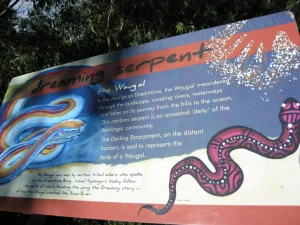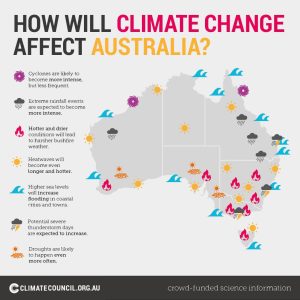(Source: Climate Council)
1. Comprehensive resources on understanding and preparing for different climate events:
These resources offer a comprehensive guide for community service organisations to plan for a range of extreme weather events. They include practical tools for emergency preparedness, warning systems, and financial support to strengthen resilience.
- Collaborating 4 Inclusion
- Red Cross provides useful emergency management resources, including preparedness for people with chronic illness, children, etc.
- RediPlan Plan for an emergency
Read more:
The Role of Community Service Organisations
Disaster Resources Collection – Warning systems, financial support, insurance, contacts
3. Heatwave adaptation: Understanding and preparing for Heatwaves
Extreme heat can have severe impacts on vulnerable communities, particularly those in poverty or living in poorly insulated homes. These resources provide strategies for adapting to heat waves, promoting cooler, climate-resilient homes, and addressing the health risks associated with heat.
Summer Heat Survey 2024
The Australian Council of Social Service (ACOSS) conducted an online Heat Survey during the 2023-24 summer to understand how high temperatures, home energy performance, energy costs, and income affect people. The survey aims to support those facing financial and social challenges by advocating for cooler, healthier, and more climate-resilient homes, especially for those most in need. It provides important insights into how extreme heat impacts people’s physical and mental health, well-being, and daily activities when they can’t cool their homes. The findings highlight how poverty and poorly performing homes make it harder for people to cope with intense heat.
- ACOSS Summer Heat Survey 2024
- The Climate Justice Union has developed a great overview with information on Extreme Heat, risk and recommendations – Climate Justice Union
- Disaster Risk Reduction & Resilience has developed a Heat Action Plan
- Heatwave strategies for local government (Government of Western Australia, Department of Health
- Heatwaves – be prepared for extreme heat (Department of Health)
- RedCross provides detailed information on Heatwaves and hot weather
- CASE STUDY: Stuck in the Heat – Lived Experiences of Public Housing Tenants in the Kimberley
- Heat waves fact sheets (Climate Psychiatry Alliance)
3. Bushfire adaptation: Understanding and preparing for Bushfire
Bushfires pose significant risks, especially during dry seasons, making preparation critical for communities. Case studies offer insights into how health systems can become more resilient in the face of increasing bushfire threats.
Case study
4. Flood adaptation: Understanding and preparing for flooding
Flooding can devastate communities, but proper preparation can minimise damage and ensure quick recovery. The resources include case studies from Queensland and NSW floods, highlighting lessons learned and effective flood management strategies.
Case study
5. Storm and cyclone adaptation: Understanding and preparing for extreme storms
Severe storms and cyclones can cause widespread damage, but preparation can make a difference. The case study on Cyclone Yasi demonstrates how communities can build resilience and recover more effectively after such extreme weather events.
Case study
Cyclone Yasi – communities building disaster resilience
6. Drought adaptation: Understanding and preparing for draughts and water scarcity
Droughts and water scarcity are becoming more frequent, especially in regions like Western Australia. These resources offer guidance on managing water resources efficiently and adapting agricultural practices to mitigate the impact of prolonged droughts.
Casy study
Water Scarcity: Climate change & WA – Water Corporation
Climate Trends in Western Australia – Agriculture and Food
7. Food security in Western Australia
Food security is a growing concern due to climate change, particularly in Western Australia. These resources explore strategies to ensure stable food supplies, focusing on sustainable farming practices and resilience in food systems.
Case study
Food security plan for Western Australia – Curtin University and Perth NRM
Feeding a hungry nation: Climate Change, food and farming in Australia
8. Aboriginal and Torres Strait Islander perspectives on different climate extremes
Aboriginal and Torres Strait Islander perspectives on climate risk are rooted in a deep, reciprocal relationship with Country, where environmental changes are understood through generations of knowledge, observation, and cultural practices. Aboriginal and Torres Strait Islander Peoples experience climate events such as heatwaves, droughts, and floods not only as physical phenomena but as disruptions to the health and well-being of Country and community. These events are viewed in the broader context of their connection to land, water, and sky, where shifts in climate affect ecosystems, cultural practices, and survival.
For example, during droughts, Indigenous Peoples have traditionally drawn on their intimate knowledge of water sources, seasonal cycles, and sustainable land management practices to mitigate the impacts. Similarly, in the face of heatwaves, they rely on knowledge of local flora and fauna to guide adaptive behaviours, such as seeking shelter in specific areas or altering food sources.

(Source: Tapping into Aboriginal knowledge to create a water-resilient future for Australia’s cities)
These responses are based on an understanding of Country as a living entity, where maintaining balance and harmony with the environment is essential to sustaining both human and ecological health.
Country is not simply land but a source of cultural identity, spiritual connection, and sustenance. Climate events, therefore, are more than environmental challenges—they are threats to the cultural, social, and spiritual fabric of Indigenous communities. Heatwaves, for instance, may disrupt traditional practices and ceremonies, while drought can diminish the availability of culturally significant plants and animals, impacting both livelihoods and heritage.
Therefore, preparing for climate extremes requires acknowledging unique perspectives on climate risk. It involves ensuring that Aboriginal and Torres Strait Islander Peoples have the power to lead decision-making processes regarding climate preparation. Aboriginal and Torres Strait Islander insights into managing Country and mitigating climate risks offer invaluable guidance to prepare for the changing climate.
Read more
Understanding How Indigenous Knowledge Contributes to Climate
Change Adaptation and Resilience: A Systematic Literature Review
Indigenous perspectives on climate risk


